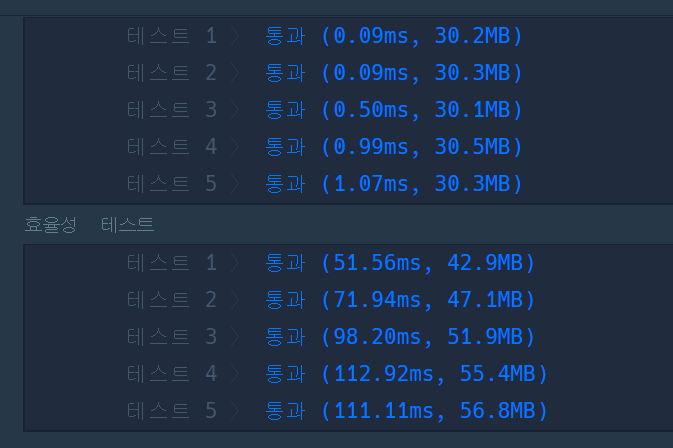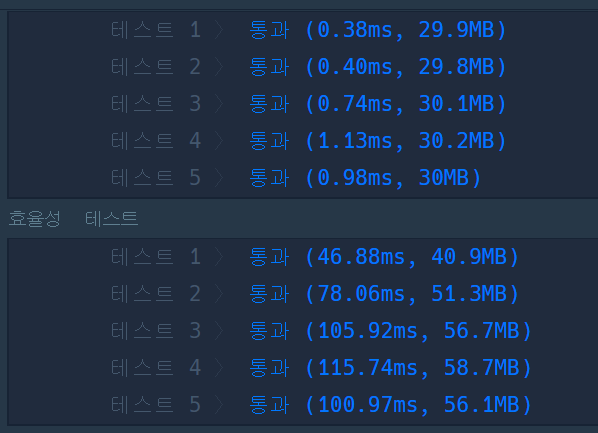문제
1. 일반 코드
function solution(participant, completion)
{
participant.sort()
completion.sort()
return participant.filter((name,i) =>{
if(name !== completion[i])
return true;
})[0]
}2.지연실행 코드
const go = (...list) => reduce((a, f) => f(a), list);
const curry = (f) => (a, ..._) =>
_.length ? f(a, ..._) : (..._) => f(a, ..._);
const reduce = curry((f, acc, iter) => {
if (!iter) {
iter = acc[Symbol.iterator]();
acc = iter.next().value;
}
for (const a of iter) {
acc = f(acc, a);
}
return acc;
});
const L = {};
// 일정 길이만큼 가져온다. (현재는 사용X)
L.range = function* (l) {
let i = -1;
while (++i < l) {
yield i;
}
};
// 배열만큼을 순회한다. (현재는 사용X)
L.map = curry(function* (f, iter) {
for (const a of iter) yield f(a);
});
// 해당 값과 index 값을 배열로 받아온다.
L.arrAndIdx = curry(function* (f, iter) {
var index = 0;
for (const a of iter)
if (f(a)) {
yield [a, index++];
}
});
// 함수를 만족하는 filter 값을 가져온다.
L.realFilter = curry(function* (f, iter) {
for (const a of iter) {
if (f(a)) {
yield f(a);
}
}
});
//원하는 갯수만큼 지연 값을 가져온다
const take = curry((l, iter) => {
let res = [];
for (const a of iter) {
res.push(a);
if (res.length == l) return res;
}
});
function solution(participant, completion)
{
participant.sort()
completion.sort()
return go(
participant,
L.arrAndIdx((n) => n),
L.realFilter((n) => {
if(n[0] !== completion[n[1]])
return n[0];
}),
take(1)
)[0];
}기존배열에서 배열과 idx를 받아온 후(
L.arrAndIdx)
filter를 통해 해당 배열 값과 그때 해당하는 인덱스 값이 같이 않는 때의 값(L.realFilter)을
하나 리턴(take(1))한다.
3. 지연코드 수정
객체형태로 처리
const go = (...list) => reduce((a, f) => f(a), list);
const pipe = (...fs) => (a) => go(a, ...fs);
const curry = (f) => (a, ..._) =>
_.length ? f(a, ..._) : (..._) => f(a, ..._);
const reduce = curry((f, acc, iter) => {
if (!iter) {
iter = acc[Symbol.iterator]();
acc = iter.next().value;
}
for (const a of iter) {
acc = f(acc, a);
}
return acc;
});
const L = {};
// 일정 길이만큼 가져온다. (현재는 사용X)
L.range = function* (l) {
let i = -1;
while (++i < l) {
yield i;
}
};
// 배열만큼을 순회한다. (현재는 사용X)
L.map = curry(function* (f, iter) {
for (const a of iter) yield f(a);
});
// 해당 값과 index 값을 객체로 받아온다.
L.arrAndIdx = curry(function* (f, iter) {
var index = 0;
for (const a of iter)
if (f(a)) {
yield {val : a, idx : index++};
}
});
// 함수를 만족하는 filter 값을 가져온다.
L.realFilter = curry(function* (f, iter) {
for (const a of iter) {
if (f(a)) {
yield f(a);
}
}
});
//원하는 갯수만큼 지연 값을 가져온다
const take = curry((l, iter) => {
let res = [];
for (const a of iter) {
res.push(a);
if (res.length == l) return res;
}
});
function solution(participant, completion)
{
participant.sort()
completion.sort()
return go(
participant,
L.arrAndIdx((n) => n),
L.realFilter((n) => {
if(n.val !== completion[n.idx])
return n.val;
}),
take(1)
)[0];
}4. 지연코드 수정 (pipe 추가)
const go = (...list) => reduce((a, f) => f(a), list);
const pipe = (...fs) => (a) => go(a, ...fs);
const curry = (f) => (a, ..._) =>
_.length ? f(a, ..._) : (..._) => f(a, ..._);
const reduce = curry((f, acc, iter) => {
if (!iter) {
iter = acc[Symbol.iterator]();
acc = iter.next().value;
}
for (const a of iter) {
acc = f(acc, a);
}
return acc;
});
const L = {};
// 일정 길이만큼 가져온다. (현재는 사용X)
L.range = function* (l) {
let i = -1;
while (++i < l) {
yield i;
}
};
// 배열만큼을 순회한다. (현재는 사용X)
L.map = curry(function* (f, iter) {
for (const a of iter) yield f(a);
});
// 해당 값과 index 값을 객체로 받아온다.
L.arrAndIdx = curry(function* (f, iter) {
var index = 0;
for (const a of iter)
if (f(a)) {
yield {val : a, idx : index++};
}
});
// 함수를 만족하는 filter 값을 가져온다.
L.realFilter = curry(function* (f, iter) {
for (const a of iter) {
if (f(a)) {
yield f(a);
}
}
});
//원하는 갯수만큼 지연 값을 가져온다
const take = curry((l, iter) => {
let res = [];
for (const a of iter) {
res.push(a);
if (res.length == l) return res;
}
});
function solution(participant, completion)
{
participant.sort()
completion.sort()
const result = pipe(
L.arrAndIdx((n) => n),
L.realFilter((n) => {
if(n.val !== completion[n.idx])
return n.val;
}),
take(1)
)
return result(participant)[0];
}실행 결과
1. 일반

2. 지연

문제 자체는 별반 차이는 안난다.
